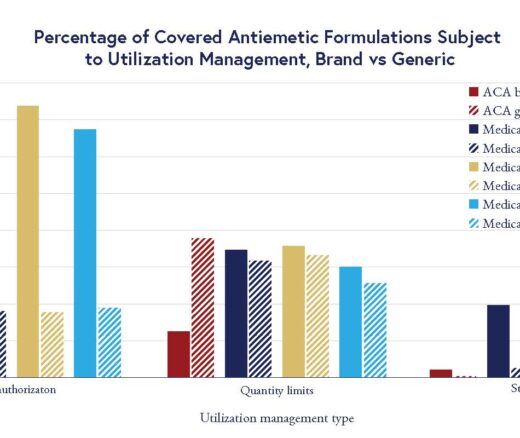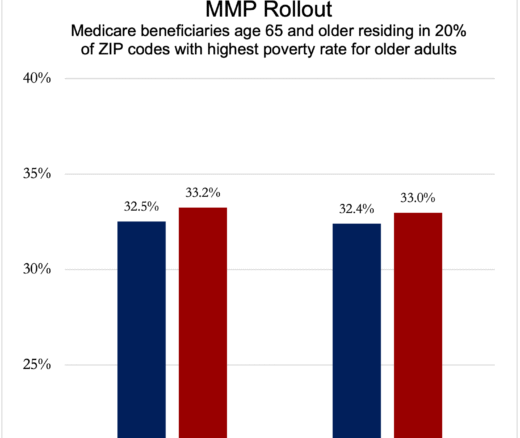
Insurers’ Utilization Management Tools Vary Widely on Anti-Nausea Drugs for Cancer
Chart of the Day: LDI Researchers Report Major Coverage Differences Across ACA and Medicaid Plans, Affecting Access to Drugs That Treat Chemo-Related Nausea
Blog Post
Whether you’re a health care manager ruminating about care practices, a clinician learning about health care management, or an MBA student learning about the business of care, it’s critical to know how to use evidence to effectively enact and evaluate health system innovations. A new book provides guidance from Penn experts in health care economics and policy research, led by Mark Pauly and many LDI Fellows. The premise of this deeply researched and readable book is that health care in the United States needs help, and evidence rather than alchemy can provide that assistance.
Too often, decisions in health care are made on instinct rather than evidence. To illustrate this, consider the question: Can health care management be less like the NBA and more like the Federal Drug Administration (FDA)? Health care managers often behave like a professional basketball coach in the middle of a game, choosing strategies and making decisions based on current conditions, contingencies, and built-up experiences. While instinct-driven decisions may be fine for sports, often they are not the best decisions, particularly in complex areas such as health care delivery. In these cases, the better model may be exemplified by the FDA: Use randomized controlled trials and evidence-based standards to vet innovations and decide if and when they are offered to patients. But are decisions about health care innovations based on evidence rather than instinct?
In the book, Seemed Like a Good Idea: Alchemy versus Evidence-Based Approaches to Health Care Management Innovation, 11 experts from across the University of Pennsylvania’s Wharton School, Perelman School of Medicine, School of Nursing, and Children’s Hospital of Philadelphia survey the state of evidence for management practices. Overall, they find that in opposition to clinical care delivery, the management of care — from financing to organizational structure to behavioral interventions — relies on strikingly little rigorous evidence. Much of the care delivered (and paid for) by the private and public health sectors is without a strong evidence base.
Yet not all hope is lost, the authors argue. In fact, a growing body of management-related evidence can guide managers and practitioners in selecting and adapting care innovations to their system, while holding fast to rigorous, even academic, standards for proof of effectiveness. Across 12 chapters and numerous direct examples, the authors weave their health policy and management scholarship in practical lessons described in easily digested, actionable readings.
An example of how the book integrates scholarship and practical guidance is a chapter by LDI Senior Fellow Mary Naylor and LDI Executive Director Rachel M. Werner on evidence-based approaches to improving how older adults transition from an acute situation, such as a hospital stay to other care. The authors give examples of transitional care programs, summarizing features with poor evidence of effectiveness, such as relying only on post-discharge phone calls from hospital staff; and characteristics of effective solutions, such as focusing on patients at highest risk of readmission and customizing their services.
However, few of these effective steps are implemented. Therefore, the authors include proven solutions to accelerate uptake such as giving decision-makers tools to estimate their return on investment (ROI). This chapter, like the entire book, shows how to apply evidence — not just alchemy — to health care innovation, laid forth in clear and simple language.
Health care and insurance innovators will still incorporate their experience and accumulated knowledge in decisions, much like an NBA coach. The authors hope, however, that the book will help them move from speculative to evidence-supported management. The book will support people seeking to increase the ROI on management-based interventions — from practitioners in hospital systems to medical groups to insurance organizations. The chapters stand alone for use in executive teaching or the MBA classroom but are also combined as an essential guide for any leader’s collection.
The book, Seemed Like a Good Idea: Alchemy versus Evidence-Based Approaches to Health Care Management Innovation by Mark Pauly, Flaura Winston, Mary Naylor, Kevin Volpp, Lawton Robert Burns, Ralph Muller, David A. Asch, Rachel M. Werner, Bimal Desai, Krisda Chaiyachati, and Benjamin Chartock is available from Cambridge University Press.



Chart of the Day: LDI Researchers Report Major Coverage Differences Across ACA and Medicaid Plans, Affecting Access to Drugs That Treat Chemo-Related Nausea

Insurers Avoid Counties With Small Populations and Poor Health but a New LDI Study Finds Limited Evidence of Anticompetitive Behavior

A Proven, Low-Risk Treatment Is Backed by Major Studies and Patient Demand, Yet Medicare and Insurers Still Make It Hard To Use

Chart of the Day: Medicare-Medicaid Plans—Created to Streamline Care for Dually Eligible Individuals—Failed to Increase Medicaid Participation in High-Poverty Communities
Research Brief: Shorter Stays in Skilled Nursing Facilities and Less Home Health Didn’t Lead to Worse Outcomes, Pointing to Opportunities for Traditional Medicare

How Threatened Reproductive Rights Pushed More Pennsylvanians Toward Sterilization